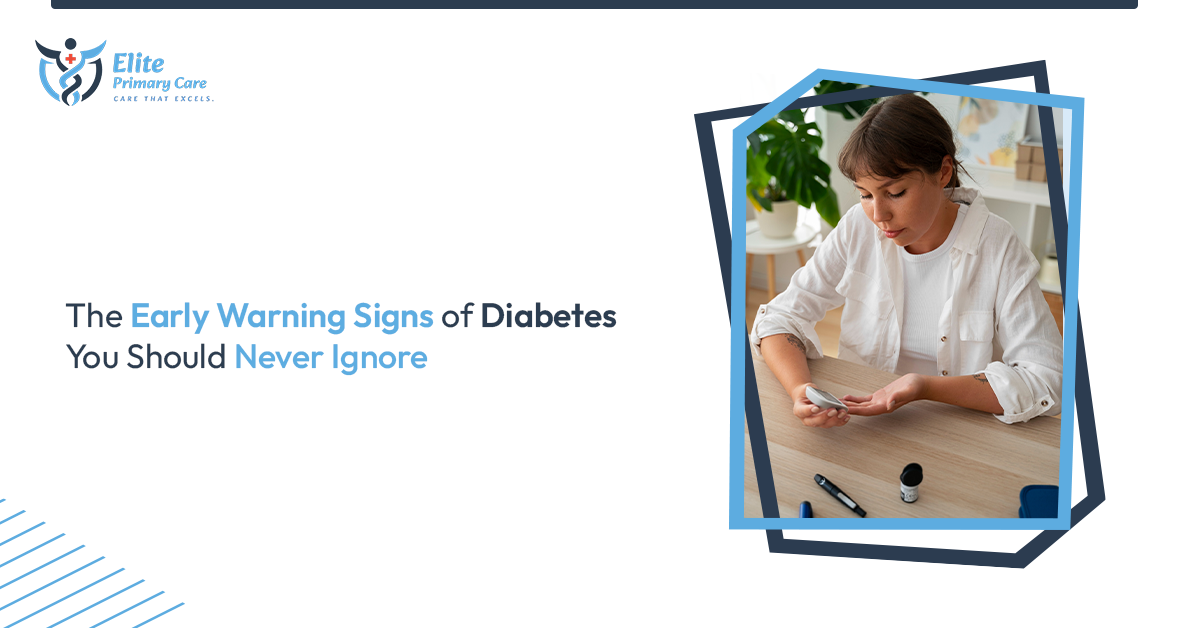Diabetes is a serious health issue impacting millions worldwide. Many individuals may remain unaware of their condition until it has progressed to an advanced stage.
At Elite Primary Care, we work to detect health issues early and support you personally to maintain good health.
Before something becomes serious, your body usually lets you know the symptoms. The medical term for these signs is early warning signs.
We should look at some early signs of diabetes that you should never miss.
What Is Diabetes?
Diabetes is a metabolic disorder. It happens when the body doesn’t make enough insulin or can’t use it well. With insulin, sugar in your blood is transferred to your cells. With malfunctioning insulin, there is too much sugar in your blood.
The two primary forms of diabetes are:
- Type 1 Diabetes: Your body fails to generate insulin.
- Type 2 Diabetes: Your body generates insulin, but it won’t have much impact.
Doctors also talk about a condition called prediabetes. So, your blood sugar is not at a diabetic level but is greater than usual. Noticing these early symptoms stops it from becoming diabetes.
At Elite Primary Care, we offer preventive services, including routine screenings, to catch these issues early.
Common Early Warning Signs of Diabetes
At Elite Primary Care, we encourage you to watch for these early symptoms and book an appointment if you notice any of the following:
1. Frequent Urination
If you go to the bathroom more often, especially at night, it might be your body trying to flush out excess sugar through urine.
What to watch for:
- Urinating more than 8 times per day
- Waking at night to urinate
- Clearer, higher-volume urine
Ignored, this symptom causes dehydration and electrolyte imbalance. Get a quick, non-invasive blood sugar screening to understand the cause.
2. Constant Thirst
You’re always thirsty, no matter how much you drink. You might be losing too much fluid through urine. Signs include:
- Persistent dry mouth
- Lightheadedness
- An unquenchable need for water
3. Sudden Weight Loss
Some sudden weight loss can be a major symptom of the body’s inability to access glucose while starving and consuming muscles and fat for energy.
4. Extreme Hunger (Even After Eating)
You might feel hungry even after you have eaten your meal. Because your body cannot manage sugar as it should, it keeps seeking more energy.
5. Fatigue and Weakness
Constant tiredness, even after adequate and peaceful sleep, might give a clue to some abnormality in your body’s sugar handling.
We take fatigue seriously at Elite Primary Care. It can be associated with many other possible medical problems like diabetes, thyroid malfunction, or anemia, which we help diagnose and manage.
6. Blurred Vision
Rising blood sugar levels may negatively affect your vision because they can blur the lens of your eye. You shouldn’t put it off; our team will work to identify and rule out any possible conditions.
7. Slow-Healing
Diabetes can slow wound circulation, making healing harder. Inform your doctor if cuts, bruises, or wounds persist in recovery.
8. Numbness or Tingling Sensation in Hands and Feet
This feeling is called diabetic neuropathy. It happens when high blood sugar levels damage the nerves.
9. Recurrent Infections
Bladder, yeast, and skin infections often relate to high glucose levels. The increased sugar supports germ growth.
At Elite Primary Care, we treat the infection and the underlying cause, ensuring long-term relief and support.
10. Dark Skin Patches
Acanthosis nigricans display dark, smooth neck, axilla, or groin patches. It may signal insulin resistance.
What Causes Diabetes?
At Elite Primary Care, we focus on recognizing your risk factors, including:
- Family history
- Being overweight
- Sedentary lifestyle
- Poor diet
- Previous gestational diabetes
How Do You Know If You Have Diabetes?
Doctors can do a simple blood test to check your sugar levels. Here are some standard tests:
- Fasting Blood Sugar Test: Measures blood sugar after not eating for eight hours.
- A1C Test: This shows your average blood sugar over three months.
- Glucose Tolerance Test: Measures how your body handles sugar over time.
Book a preventive screening appointment with our team at Elite Primary Care, early detection can change everything.
What Happens If You Ignore the Signs?
Ignoring these signs can lead to serious long-term problems:
- Heart disease
- Kidney damage
- Nerve damage
- Vision loss or blindness
- Amputations from foot issues
Your health doesn’t have to reach a crisis point. At Elite Primary Care, we help you take control before complications occur.
What Should You Do If You See These Signs?
If someone you know or yourself is demonstrating any of these symptoms:
- Visit a doctor as soon as you notice something is wrong.
- Request that a blood sugar test be done.
- Begin to eat healthier and be more physically active.
Act before it’s already too late. Early steps can stop it or make it easier to manage.
Preventative Tips from Elite Primary Care
We believe prevention is the best medicine. Here’s what we recommend to protect your health:
- Eat a well-balanced diet
- Exercise regularly
- Maintain a healthy weight
- Stay hydrated
- Get regular checkups
- Avoid smoking and limit alcohol
Need guidance on making sustainable health choices? Nutritional consultation, individual screenings and ongoing classes are available through our Elite Primary Care team.
Paying attention to senior nutrition is particularly important, as proper dietary habits can reduce diabetes risk and support overall older adults’ health.
Final Thoughts
Diabetes doesn’t appear overnight, your body usually gives you early signals that something is off. Attention to these warning signs can make all the difference in protecting your health.
At Elite Primary Care, we help you detect diabetes early on. Our experienced team provides preventive care and manages chronic diseases to help you stay healthy in the long run. Contact us.
FAQs
Q: What is the most often noticed early sign of diabetes?
Red flags are generally more trips to the restroom and feeling very thirsty, especially when an individual has Type 2 diabetes.
Q: Are symptoms the same for everyone?
Each person may experience varying diabetes signs, influenced by personal circumstances, age, and diabetes category.
Q: How should I react if I discover these symptoms?
Visit your primary care provider to have a blood sugar exam. Elite Primary Care will support you from the testing to the treatment stages with confidence and care.



No comment